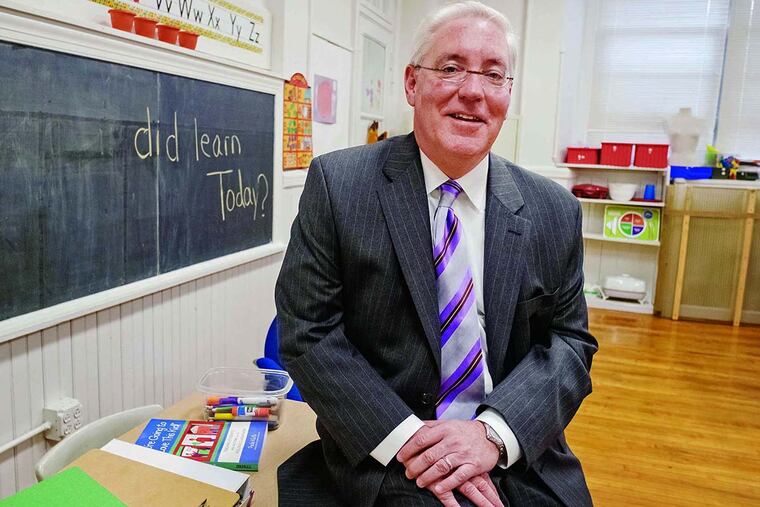Executive Q & A: Joseph S. Martz
When Joseph S. Martz, 55, was a high-schooler at Father Judge, he got an after-school job as an office boy at Home Unity Savings and Loan Association in Frankford.

When Joseph S. Martz, 55, was a high-schooler at Father Judge, he got an after-school job as an office boy at Home Unity Savings and Loan Association in Frankford.
The bank moved its base to Lafayette Hill. Martz, still in high school, followed the job to the suburbs.
"I actually work in the same building and I have the same office as the guy I worked for back when I was 17."
These days, the Lafayette Hill building houses the headquarters of NHS Human Services Inc., a 10,000-employee nonprofit that serves people with special needs, particularly those with developmental and behavioral issues.
And Martz, the former office boy, is NHS's chief executive.
For most of his career, Martz has been the number-two guy, handling operations, especially in government jobs in the city.
"I wasn't kidding when I said the greatest jobs I ever had were being the chief operating officer of something," he said. "Because, for the longest time, I thought, 'You know what? Let the mayor be responsible for all the politics. Let me just deal with the operations.' "
"I really didn't know until the last decade that I wanted to be the number-one person."
So what changed?
There was a point that it dawned on me that I didn't want to spend my life being somebody's number two.
Maybe it was during one of my long walks, where I said, 'You know what? I'd like to find out if I'm capable of being something more.'
Then you get an opportunity and hope you are ready. You've been trained by the best.
Let's go down the list. You were managing director under Mayor John F. Street.
When I worked for John F. Street, he let me lead. He let me do my job.
Before that, you worked on Ed Rendell's mayoral campaign and ended up in city government, in charge of all the city's facilities.
Ed is brilliant. What's remarkable about him is his ability to shine light on people. A lot of leaders try to shine light on themselves. Ed understood that shining light on somebody else didn't in any way diminish him.
David Cohen, now an executive at Comcast Corp., was his chief of staff.
We were just so young. David taught us how to be managers. Any idea that we brought forward in a memo would come back with a series of questions that we hadn't even thought about yet. He would drill down levels and make you think so deeply that you had to make sure that you covered everything.
If someone aspires to lead, what do you suggest?
The advice I would give is, first, to aspire to it, and second, spend time talking to people who do it. Get to know the people who do it and ask them: What's involved? What kind of commitment is it? What do you need to do? Because it sounds great, but it's not everybody's cup of tea.
Does it weigh on you when you read reports of a vulnerable youngster dying while in the care of a social service agency?
It's obviously concerning. This is hard work and you just hope you get it right. We operate 700 facilities at NHS, so I go to bed every night thinking about it. You constantly worry. People have entrusted their lives to you.
How do you handle that?
As the managing director of the city, you deal with these things - police officers being injured on the job, firefighters being hurt. The call that comes in the middle of the night where you have to go to a hospital. I don't think I ever get a complete night's sleep. I also understand that we try our best to train our people as well as we possibly can. You have to take some solace in that or it will just eat you up.
What's changing in your field?
There's going to be more of a performance-based payment system in the future, which means you're going to have to demonstrate your ability to be successful to get paid.
Behind me at NHS are people and millions of dollars of information technology to be able to do the data analytics to support that. It costs a lot of money to find the kind of people to do data analytics. I have Ph.D.s doing data analytics. We didn't have that three years ago. We're a giant provider. We have the resources to do it. The challenge is going to be for the smaller institutions.
Interview questions and answers have been edited for space.
215-854-2769
@JaneVonBergen